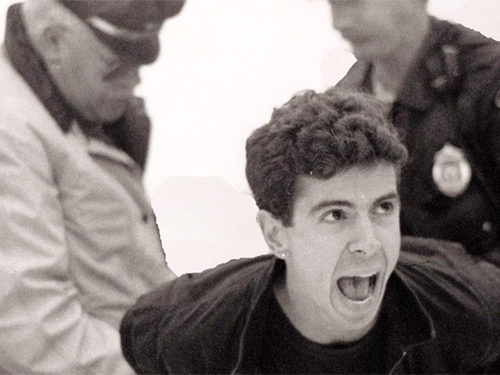
The radical gay organization Act Up drew scathing attacks after it disrupted mass at St. Patrick’s Cathedral in New York City back in 1989.
Journalist turned filmmaker David France says the group considered the protest a success no matter how many people savaged it. Group members, France argues, “wanted people to fear them.”
“That demonstration worked to their advantage even though hearts and minds were lost,” France tells Big Hollywood. “That demonstration, and many other over the top acts, were essential to gain a kind of fear of them … from the people they were dealing with.”
“How to Survive a Plague,” France’s directorial debut, chronicles the gay community’s response to the AIDS crisis in America mostly through the prism of Act Up. The film, now playing in select cities but opening wider tomorrow, argues Act Up’s methods were successful in bringing critical drugs to the public.
The movie recalls the protests, the marches and the loved ones being lost to AIDS at a time when there were very few medical resources available to counter it, let alone cure it. Gay men banded together to seek new medicinal hope, studied the obstacles blocking drugs from reaching the marketplace and embraced humor as a way to deal with the darkest of days.
France chronicled the fight as a journalist, but he learned those skills didn’t necessary ease his transition to a new medium.
“It turns out there was a lot of hubris involved in thinking I could just make the switch. It’s a much more involved and complex process, but one that was really rewarding,” he says.
France was uniquely qualified to tell the story on the big screen. Getting gay men who lived through that era to speak on the record for the film, however, proved more problematic.
“One of the reasons why this story hasn’t been told before is that there’s a reticence among survivors of those plague years to revisit them. Their memories have been locked away,” he says.
France says making the film today instead of 10 or so years ago allowed him to tell a more complete story. Yes, previous AIDS-related projects like “And the Band Played On” and “Angels in America” tackled the subject closer to its epicenter, he says. His story benefited from the time difference, in part, because he was able to see the story from other angles, like from the perspective of the drug manufacturers racing to treat AIDS patients.
The researchers were “in the trenches trying to save lives,” he says.
“Plague” shows how many AIDS activists who had no formal training in medicine or science, educated themselves on these issues and ended up teaching established researchers new ways to approach stubborn problems.
“They looked at it with a fresh pair of eyes,” he says.
France wonders what impact social media outlets like Twitter might have had in the battle against AIDS. Yes, activists would have sent messages and rallied their like-minded peers much faster than in the old, analog days of the ’80s, he says. But part of the power gay activists yielded back then was the face-to-face meetings that proved both inspiring and beneficial to the cause. That’s often missing it today’s text-friendly age, he says.
“They came up with ideas they wouldn’t have at home with their keyboards,” he says.
The AIDS crisis took a horrific toll on the country, but France says the plague did have one positive effect. In the early 1980s there were very few gay people on TV and even fewer gay elected officials.
Gays were forced to network, reach out, research and push boundaries as they never had to do before in order to battle the disease. The gay community branched out into government, pop culture and society at large “out of the ashes of the terrible plague,” he says.
“AIDS made that possible and necessary,” he says.

COMMENTS
Please let us know if you're having issues with commenting.